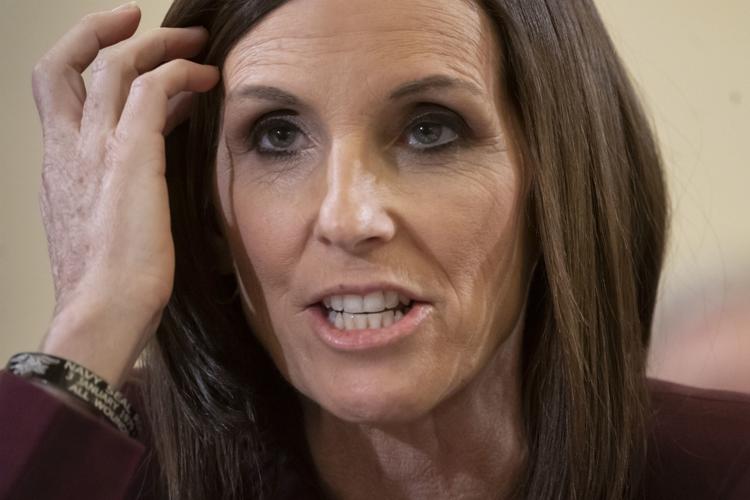President Trump often puts Sen. Martha McSally, the Tucson Republican, in awkward positions.
Whatever Trump does, supporting him helps ensure that McSally will win a GOP primary, or at least ensure that no Republican challenges her.
But when she supports his actions, she also makes herself vulnerable in the general election to the (now well-grounded) accusations that she’s become too chummy with a president she used to question.
McSally waited till the last minute this week before announcing a decision on whether she’d support the president’s declaration of a national emergency to build more barriers on the Mexican border.
In the end, predictably, she backed the president by voting against a measure overturning his emergency declaration. Twelve Republicans voted for the measure and against Trump’s declaration, making it a 59-41 vote that the president will probably veto.
Sen. Kyrsten Sinema, the Democrat from Phoenix, also announced at the last minute how she would vote: against the president’s emergency declaration, on the grounds that Congress had made a spending decision that the declaration undermined. She also disputed the assurances that McSally based her decision on.
I suspect that McSally was looking for a way to vote “no” Thursday. She’s long voted as a border-security hawk, and voting against Trump on this issue would practically invite a primary challenge. She found a way — by ensuring that no military construction projects in Arizona would lose their funding in order to put an extra $3.6 billion toward border-barrier construction, the purpose of the declaration.
In a written statement, she said: “I have spoken with the Acting Secretary of Defense, the President and Vice President to underscore that we must ensure military readiness while also funding border security. As a result, no Arizona military construction projects from Fiscal Year 2019 will be impacted. Now, it’s Congress’ turn to fully fund border security and our men and women in uniform.”
But there are problems with both parts of this formulation. During a Senate Armed Services Committee hearing on Thursday that preceded the emergency-declaration vote, Sen. Angus King, an independent from Maine, questioned the acting secretary of defense intensely about what he’d told other senators.
“Have you ensured members of the Senate, individual members, that there are not projects that are in their states that are on the chopping block?” King asked.
“No I have not,” Patrick Shanahan said. “I can tell you there are no projects in this fiscal year that will be canceled.”
When McSally’s turn to ask questions came up next, she said to Shanahan, “We did have a conversation, and there are four projects in Arizona that are appropriated in FY 19. You broadly said those FY 19 projects across all the country will not be impacted by this, just to be clear. Correct, Mr. Secretary?”
“That is correct,” Shanahan answered.
King interjected, “How does that square with what he just told me?” But McSally moved on to a new line of questioning.
The short explanation seems to be that the money for military projects funded by Congress this year doesn’t have to be spent this year, but can be spent over the next several years. So any money taken by Trump for border barriers this year can simply be funded again next fiscal year, and construction can occur in succeeding years.
But that doesn’t get to what I consider the most problematic part of McSally’s vote. She was one of 83 senators who voted “yes” on the spending bill that ended the threat of a second government shutdown on Feb. 14.
That bill did what Congress is supposed to do —it struck a compromise between the opposing parties on a key issue of the day, putting an additional $1.4 billion toward border barriers, rather than the extra $5.7 billion the president had wanted.
I don’t see how a member of Congress who voted for this compromise, as the vast majority did, can then go on to vote for a presidential declaration that overrides their compromise, even after receiving slippery promises about military funding.
Cochise kerfuffle
The kerfuffle in Cochise County started when Gov. Doug Ducey appointed Sierra Vista Justice of the Peace Tim Dickerson to be the county’s newest Superior Court judge.
That left a vacancy that the Board of Supervisors then filled with one of their own. On Feb. 12, board members Ann English and Peggy Judd voted to appoint fellow supervisor Pat Call, who recused himself from the vote, as Dickerson’s replacement.
A Sierra Vista resident, David Welch, objected and applied for a preliminary injunction, which Cochise County Superior Court Judge Laura Cardinal granted on Feb. 25, enjoining the county from taking further action on Call’s appointment. Noting that the order did not void the appointment, the board allowed Call to take office anyway on March 1.
Then on March 8, the case went to an outside judge, Monica Stauffer of Greenlee County Superior Court. She overturned the injunction, ruling that it did not meet legal standards in part because only one side of the case was heard.
But that didn't end the case, attorney Chris Russell told me Friday. The plaintiffs continue to argue in a lawsuit that Call's appointment was not valid because there was insufficient public notice about the board appointing one of its own, and because the board was supposed to take applications from the public to fill the J.P. position under Arizona law.
Call will be up for election in November 2020. On March 1, the Board of Supervisors appointed Tom Borer to replace him as supervisor in the district that includes Sierra Vista.
City candidates galore
We’ve mentioned most of the people who have registered for Tucson city offices, but a few have evaded mention. Here’s a list of everyone who has signed up so far:
Mayor:
Frank Konarski, Republican
Sam Nagy, Republican
Robert Reus, no party
Ed Ackerley, independent
Denny Crafton, Democrat
Randi Dorman, Democrat
Steve Farley, Democrat
Regina Romero, Democrat
Ward 4:
Michael Hicks, Republican
Brian Brennan, Democrat
Nikki Lee, Democrat
Ward 2:
Paul Cunningham (incumbent), Democrat
Ewart Williams, Republican
Ward 1:
Sami Hamed, Democrat
Miguel Ortega, Democrat
Lane Santa Cruz, Democrat





